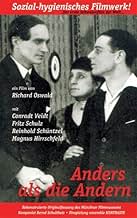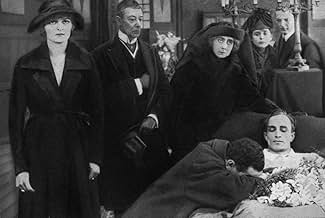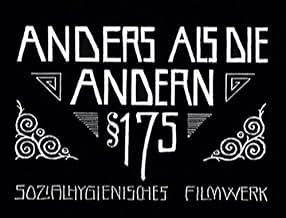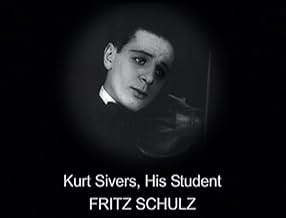AVALIAÇÃO DA IMDb
7,0/10
1,6 mil
SUA AVALIAÇÃO
Dois músicos se apaixonam, mas escândalos e chantagens causam uma reviravolta trágica no romance.Dois músicos se apaixonam, mas escândalos e chantagens causam uma reviravolta trágica no romance.Dois músicos se apaixonam, mas escândalos e chantagens causam uma reviravolta trágica no romance.
- Direção
- Roteiristas
- Elenco e equipe completos
- Produção, bilheteria e muito mais no IMDbPro
Enredo
Você sabia?
- CuriosidadesMagnus Hirschfeld, a prominent sexologist, co-wrote the screenplay and made a cameo appearance as The Doctor, with whom Paul Korner consults. A scene resembling that of the modern-day LGBT scene existed in Weimar Germany, albeit underground, and the scene at the gay bar featured actual LGBT individuals. The screenwriter and author Anita Loos said of this period, in 1923: "Any Berlin lady of the night might turn out to be a man: the prettiest girl on the street was Conrad Veidt, who later became an international film star." (It was Hirschfeld who coined the term 'transvestism.')
- Versões alternativasThere is an Italian edition of this film on DVD, distributed by DNA srl, "DIVERSI DAGLI ALTRI: Alle Origini Del Cinema Gay - Special Edition" (4 Films on a single DVD: Mikaël, 1924 + Fireworks, 1947 + Un chant d'amour, 1950 + Anders als die Andern, 1919), re-edited with the contribution of film historian Riccardo Cusin. This version is also available for streaming on some platforms.
- ConexõesEdited into Gesetze der Liebe (1927)
Avaliação em destaque
It's a wonder any of this film exists; if not for the wear of age (it's said that most films of this era are lost), one would think censorship and the Nazis would have annihilated it. Yet, much of the footage remains. The Kino release of the reconstruction fills in the rest of the story with explanatory intertitles and still photographs, nearing the film's original runtime. That's the first wonder.
The second is its message of tolerance and understanding of homosexuals. Message films, social realist films, or "enlightenment films" were not too common in the silent era, probably because the lack of sound takes away from the capacity to lecture. Lois Weber is an exception that I'm familiar with; she made a career out of selling morals to audiences. "Different from the Others" includes the tact of a self-referential scene, which Weber broadened to more interesting depths in her best work. This is a film pleading for the equality of homosexuals, and it features a lecture within the lecture doing the same: the "sexoligist" Magnus Hirschfeld giving a slideshow presentation, which is attended by Else. I think it makes the film more honest, and, at the same time, it's a way for the filmmakers to be as blunt as possible.
It's difficult to appreciate the film aesthetically, anymore. The gay nightclub scenes are frank, but the film seems to shy away from too much intimacy between homosexuals. "Philadelphia" (1993) has been criticized for it's lack of a kiss, too, so I suppose it's asking too much of a film from 1919. The camera-work appears rather static, as well. On the other hand, Conrad Veidt was an admirable man and quite an actor. This is as much bravery from a prominent actor as you'll ever see. And, he was outspoken against the Nazis, as opposed to Emil Jannings, probably the other major male star of German silent film. Although Veidt's performance is much in the style of the time, he shows the right balance of effeminacy without being stereotypical.
Other than Veidt, the film isn't of much entertainment or artistic value. The film's message, however, is very important, even today; as the reconstruction introduction says, Germany, while a generally liberal government and populace today, Paragraph 175 wasn't repealed until 1994. And, there's the marriage debate in the US and elsewhere. "Different from the Others" is powerful in that way.
The second is its message of tolerance and understanding of homosexuals. Message films, social realist films, or "enlightenment films" were not too common in the silent era, probably because the lack of sound takes away from the capacity to lecture. Lois Weber is an exception that I'm familiar with; she made a career out of selling morals to audiences. "Different from the Others" includes the tact of a self-referential scene, which Weber broadened to more interesting depths in her best work. This is a film pleading for the equality of homosexuals, and it features a lecture within the lecture doing the same: the "sexoligist" Magnus Hirschfeld giving a slideshow presentation, which is attended by Else. I think it makes the film more honest, and, at the same time, it's a way for the filmmakers to be as blunt as possible.
It's difficult to appreciate the film aesthetically, anymore. The gay nightclub scenes are frank, but the film seems to shy away from too much intimacy between homosexuals. "Philadelphia" (1993) has been criticized for it's lack of a kiss, too, so I suppose it's asking too much of a film from 1919. The camera-work appears rather static, as well. On the other hand, Conrad Veidt was an admirable man and quite an actor. This is as much bravery from a prominent actor as you'll ever see. And, he was outspoken against the Nazis, as opposed to Emil Jannings, probably the other major male star of German silent film. Although Veidt's performance is much in the style of the time, he shows the right balance of effeminacy without being stereotypical.
Other than Veidt, the film isn't of much entertainment or artistic value. The film's message, however, is very important, even today; as the reconstruction introduction says, Germany, while a generally liberal government and populace today, Paragraph 175 wasn't repealed until 1994. And, there's the marriage debate in the US and elsewhere. "Different from the Others" is powerful in that way.
- Cineanalyst
- 1 de jul. de 2005
- Link permanente
Principais escolhas
Faça login para avaliar e ver a lista de recomendações personalizadas
- How long is Different from the Others?Fornecido pela Alexa
Detalhes
- Data de lançamento
- País de origem
- Idiomas
- Também conhecido como
- Different from the Others
- Locações de filme
- Berlim, Alemanha(unknown scenes)
- Empresas de produção
- Consulte mais créditos da empresa na IMDbPro
- Tempo de duração50 minutos
- Cor
- Mixagem de som
- Proporção
- 1.33 : 1
Contribua para esta página
Sugerir uma alteração ou adicionar conteúdo ausente

Principal brecha
By what name was Diferente dos Outros (1919) officially released in India in English?
Responda


























